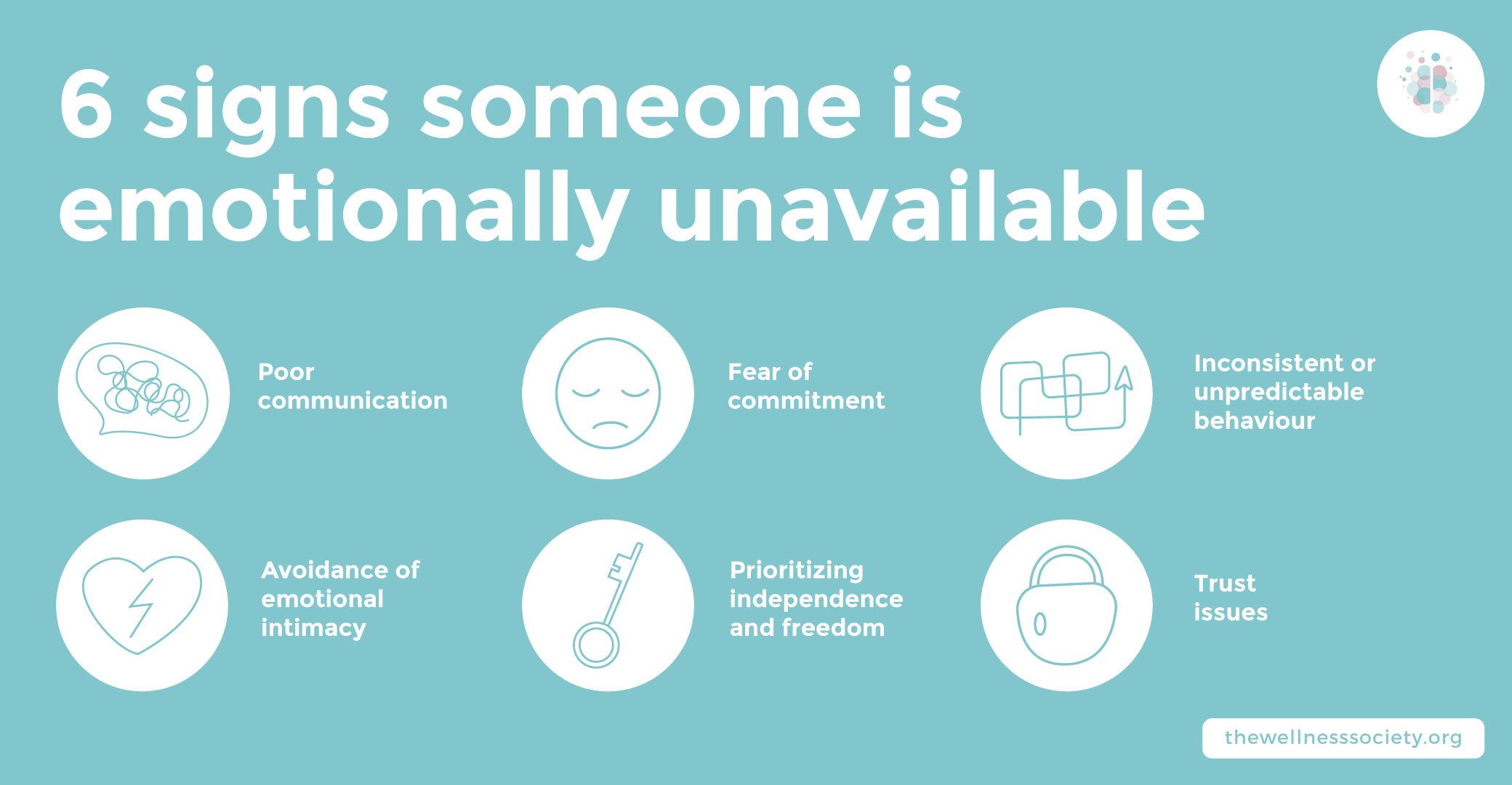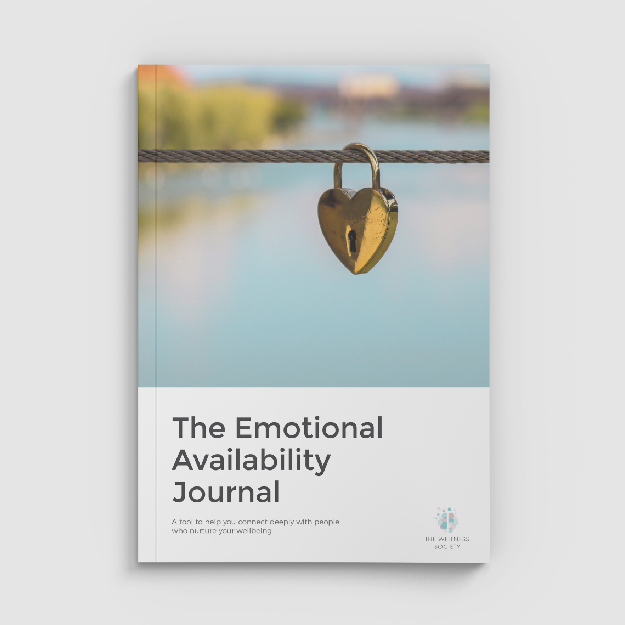Have you noticed a pattern in your relationships in which your partner – or potential partner – seems unable to offer you the love and attention you desire?
You may have a habit of seeking out emotionally unavailable men. And you may be emotionally unavailable yourself.
Emotional unavailability refers to a pattern of behaviour in which a person struggles or is unable to engage in emotionally intimate and fulfilling relationships.
In this online guide, we’ll outline:
- Signs of emotional unavailability
- Causes of emotional unavailability
- Why we're attracted to emotional unavailability
- How to become more emotionally available
Our free tool The Emotional Availability Journal (56 page PDF) helps you explore your emotional patterns, beliefs, and barriers to emotional availability.
Explore why you're attracted to emotional unavailability, increase your self-awareness, and identify areas for growth and change.
Discover a wealth of information, journaling exercises and practical tips.
One user said:
"I can't believe how many insights I've had from doing the journaling exercises. More than I've had in two years of therapy. I understand myself better and I'm making changes that I know will help me improve my relationships."
Download it for free below:
6 Signs of Emotionally Unavailable Men
What are the signs that someone is emotionally unavailable?
- Poor communication. They show a lack of investment in maintaining regular contact or conversation. They might be slow to respond to messages or provide minimal information when communicating.
- Avoidance of emotional intimacy. Emotionally unavailable people often find it challenging to open up and share their deeper thoughts, fears, or insecurities. They may deflect or change the subject when discussions become emotionally intimate or avoid talking about personal matters altogether.
- Fear of commitment. Avoidance of long-term commitment are common among emotionally unavailable people. They may be hesitant to enter into or progress in a committed relationship, often maintaining emotional distance or creating barriers that prevent deeper connection.
- Prioritizing independence and freedom. Emotionally unavailable people tend to prioritize their independence and personal freedom over building and nurturing emotional connections. They may resist merging their lives, sharing responsibilities, or making compromises that come with a committed relationship.
- Inconsistent or unpredictable behaviour. They may display inconsistent patterns of behaviour, oscillating between moments of closeness and emotional withdrawal.
- Trust issues. Building trust can be challenging for emotionally unavailable people. They may have trust issues stemming from past experiences or personal insecurities which make it difficult for them to fully rely on their partners.
Causes of Emotional Unavailability
1. Past Trauma
One significant factor is past trauma or abuse.
Individuals who’ve experienced traumatic events or abusive relationships may develop emotional unavailability as a type of defense mechanism. They may learn to disconnect from their emotions and avoid vulnerability in order to protect themselves from further emotional pain.
Fear of being hurt, rejected, or engulfed by the intensity of emotional connection can lead them to maintain emotional distance from others.
Past trauma can lead to the development of an insecure attachment style. Attachment styles, which develop in early childhood through interactions with caregivers, shape how we relate to others emotionally. Those with an insecure attachment style may struggle with emotional intimacy and tend to keep others at a distance.
2. External Conditioning
Emotionally unavailable men may have had inadequate emotional role models during childhood. Growing up in an environment where emotional expression and connection were not modeled or valued can limit a person’s ability to engage in emotionally intimate relationships.
They may also live in a culture which doesn’t favour masculine expression of emotion, perpetuating the notion that men should be stoic and avoid vulnerability. In such cultures, societal expectations might discourage men from openly expressing their feelings or seeking emotional support.
3. Lifestyle Factors
In addition, certain lifestyles or demanding careers may make it challenging for people to invest emotionally in a relationship. They may have limited time and energy available due to work commitments, travel, or other obligations, making it difficult to sustain a deep emotional connection.
Also, some people may be emotionally unavailable due to their focus on self-discovery and personal growth. They may want to explore different connections and develop a deeper understanding of their own needs and desires before committing to a serious relationship.
Why You're Attracted to Emotionally Unavailable Men
While there’s no definitive answer, several theories attempt to explain why this attraction occurs. An underlying possible root cause of many of these theories is: You’re emotionally unavailable yourself.
You might be attracted to other emotionally unavailable men due to:
- Avoidance of emotional intimacy
- Familiarity
- Repetition compulsion
- Cravings/limerence
Let’s explore each of these in more detail.
Avoidance of Emotional Intimacy
Emotionally unavailable people often have difficulties with emotional intimacy and vulnerability.
Being with another emotionally unavailable person allows them to avoid the discomfort associated with opening up emotionally. They may feel less pressure to address their own emotional challenges or confront their fear of intimacy when their partner shows similar behaviours.
Emotional unavailability can also provide a clear boundary between emotionally unavailable people and their partner, creating a sense of psychological safety. The lack of emotional intimacy can be appealing for individuals with C-PTSD who struggle with boundary-related difficulties.
Familiarity
Emotional unavailability can feel familiar and comfortable to people who’ve grown accustomed to this dynamic. They might find it easier to relate to someone who shares similar emotional patterns.
The familiarity of emotional unavailability can create a sense of safety and a perception of control over the known dynamics, even if it's ultimately unhealthy.
As humans, we have an inherent aversion to uncertainty – the unknown can trigger feelings of fear, doubt, and vulnerability, which we want to avoid.
Repetition Compulsion
We might unconsciously seek out relationships that mirror our past experiences.
If we grew up in an environment with emotionally unavailable caregivers, we might unintentionally be drawn to emotionally unavailable partners as a way to repeat or recreate familiar patterns.
This repetition compulsion may stem from a subconscious desire to resolve past unresolved issues or gain a sense of control over the situation.
Cravings/Limerence
If you had an emotionally unavailable or emotionally immature caregiver, it’s likely that as a child, you were craving their love and attention.
Now, as an adult pursuing a similarly emotionally distant person, the same brain circuits involving cravings may be triggered.
It’s interesting to note that craving is distinct from liking. Much research has been done into this in the field of drugs and addiction.
In the context of drugs, liking refers to the hedonic experience or pleasure derived from taking a drug, while wanting refers to the motivational aspect or the craving for the drug.
Drugs can induce intense wanting, even in the absence of liking.
Both love and drugs can produce dopamine in the brain, and there are similarities in how they affect the brain's reward system.
It’s worth considering: How much do you want/crave vs like the emotionally unavailable person? How much are you craving their love and attention as opposed to actually liking them? How well do you really know them?
Limerence is a related concept here. This involves experiencing thoughts and yearnings about your love interest that are uncontrollable and all-consuming. It’s different from genuine love because it’s not necessarily based on a deep emotional connection.
Just like a perceived threat can trigger the stress response, an emotionally distant person may trigger a limerence response in us.
It’s a form of conditioning – like Pavlov’s dogs drooling with saliva at the ring of a bell, we crave attention at the hands of emotionally unavailable men.
For detailed guidance and journaling prompts to help you distinguish between love and limerence, download our free Emotional Availability Journal (56 page PDF) at the bottom of this page.

3 More Reasons Why You Have a Pattern of Pursuing Emotionally Unavailable Men
1. Low Self-Esteem
People with low self-esteem may unconsciously seek out emotionally unavailable partners because they believe they don't deserve someone who is emotionally available.
They might feel more comfortable in relationships where their own emotional needs take a backseat to their partner's unavailability.
2. Romanticizing the Challenge
Some people find the idea of "winning over" an emotionally unavailable person appealing. They may perceive this challenge as an opportunity to prove their worth or demonstrate their love and dedication.
The belief that they can be the one to unlock the emotional barriers can be enticing, despite the potential difficulties involved.
3. Stimulation Seeking
Another theory is that pursuing emotionally unavailable people produces stress hormones, and these are in some ways addictive.
You might get used to the stimulation of cortisol and seek situations that maintain your emotional arousal. If you’re used to cortisol-fuelled relationships, healthy relationships may have a “boring” feel to them in comparison – like something's missing.
While the stimulation of cortisol might initially create a sense of excitement, long-term engagement with emotionally unavailable people can lead to distress, dissatisfaction, and a perpetuation of unhealthy relationship patterns.
How to Become More Emotionally Available
If you’re drawn to emotionally unavailable men because you’re emotionally unavailable yourself, the obvious solution is to become more emotionally available. How to do this? We have lots of practical tools and information that you might find helpful.
Work on Your Self-Esteem
There are many ways you can boost your self-esteem, for example:
- Work on your positive self-talk.
- Identify your strengths and talents – here’s a free Character Strengths Test. Find opportunities to apply your strengths in different areas of your life. Pay attention to them.
- Seek out relationships with people who are supportive, encouraging, and accepting. Healthy relationships can provide emotional support, validation, and feedback that contributes to improved self-esteem.
- Invest in your personal growth. Set realistic and achievable goals using practical tools such as The Life Balance Wheel and The GROW Planner.
- Using affirmations: here’s a list.
- Improve your assertiveness skills.
Enhancing self-esteem fosters a heightened sense of self-worth and self-respect. This cultivates healthier relationships through the establishment of improved boundaries – you develop discernment around what you will and won’t accept.
With better self-esteem, you’ll develop a greater understanding of your own worth and recognize your right to be treated with respect, kindness, and consideration.
Consequently, you’ll become more adept at filtering out emotionally unavailable people.
Improve Your Communication Skills
Practice expressing your emotions, needs, and desires clearly and honestly with others.
Effective communication promotes understanding and allows for deeper emotional connections. Be willing to engage in conversations that may be uncomfortable but necessary for building emotional intimacy and trust.
Nonviolent Communication (NVC) is a communication framework developed by psychologist Marshall B. Rosenberg that can help you with this. It focuses on promoting empathetic connections, resolving conflicts, and fostering understanding without resorting to harmful behaviours such as stonewalling.
Build Self-Awareness Through Journaling
Our free tool The Emotional Availability Journal (56 page PDF) helps you explore your emotional patterns, beliefs, and barriers to emotional availability.
Explore why you're attracted to emotional unavailability, increase your self-awareness, and identify areas for growth and change.
Discover a wealth of information, journaling exercises and practical tips.
One user said:
"I can't believe how many insights I've had from doing the journaling exercises. More than I've had in two years of therapy. I understand myself better and I'm making changes that I know will help me improve my relationships."
Download it for free below:

